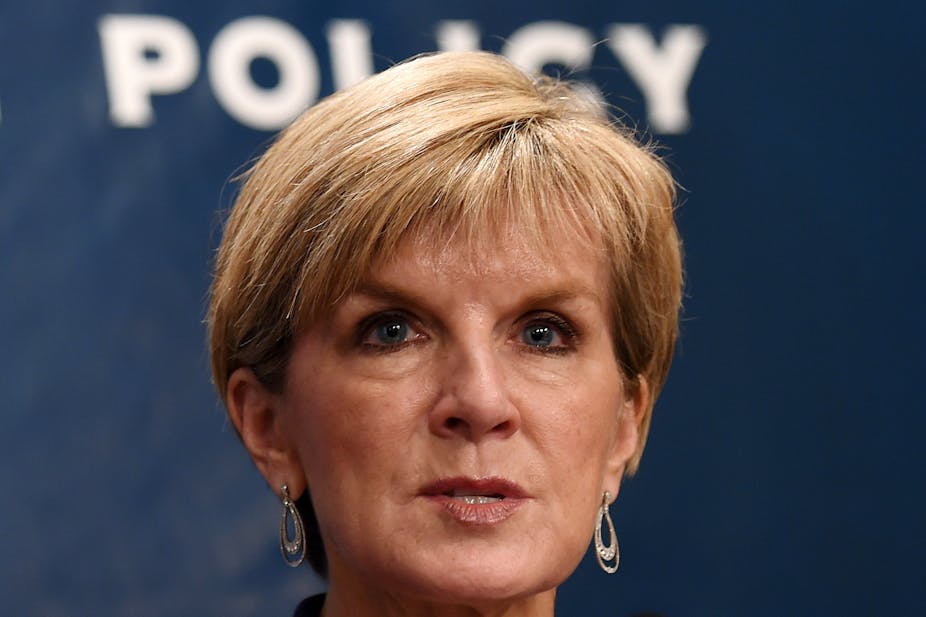The government has admitted that it will do whatever it takes to keep the boats stopped and, it seems, if that takes slapping the Indonesians around a bit, it doesn’t seem too concerned.
As senior Indonesian figures demand an explanation about whether Australia paid $US30,000 to get 65 asylum seekers on their way back, the federal government is treating their concerns in a quite cavalier way – the Indonesians might think a disdainful one.
In remarkably forthright language, Foreign Minister Julie Bishop told The Australian: “The best way for Indonesia to resolve any concerns it has about Operation Sovereign Borders is for Indonesia to enforce sovereignty over its borders.
"Operation Sovereign Borders is necessary because Indonesian boats with Indonesian crews are leaving Indonesia with the express intention of breaching our sovereignty, facilitated by illegal people-smuggling syndicates.”
In parliament on Monday, Tony Abbott held his line on refusing to say whether money was paid. The two ministers who denied it last week, Bishop and Immigration Minister Peter Dutton, wouldn’t do so again when questioned.
Meanwhile, a report in the Daily Telegraph suggested that Australia’s overseas spying service ASIS may have been involved in paying people smugglers. To add a touch of further intrigue, it is said that the mystery man with the cash, Agus, did not wear a uniform and moved between the Navy ship and the Customs vessel in the incident about which answers are being refused.
Abbott has been remarkably frank in making it clear that when it comes to stopping boats, ends justify means – although he does say, within the law. And it is equally clear his message is tailored to the voting public.
The Lowy Institute’s annual poll on Australians’ attitudes to the world, released on Tuesday, was done months ago – but its results are very pertinent to Abbott’s current approach.
In the poll, 87% said Indonesia should do more to help Australia combat people smuggling. It also found that Australians’ feelings about Indonesia have fallen to their lowest point in eight years. This puts Indonesia on a par with Russia and Egypt in the degree of warmth Australians feel towards it.
These results suggest that Abbott has a well of anti-Indonesian public feeling to draw on in any stoush with that country. The question mark in the present case, however, is whether Australians would have strong reservations about greasing the palms of those involved in the criminal activity of people smuggling.
The Lowy results equally show the popular bedrock underlying Abbott’s move to strip citizenship from dual nationals involved in terrorism.
The survey predated the specific move, but it found that fewer Australians feel “very safe” than previously in relation to world events and people see the country’s main security threats coming from terrorism. Notably, 69% picked, from a list of eight possible risks, the emergence of Islamic State in Iraq and Syria as a “high risk” to Australia’s security in the next ten years.
The government may be in all sorts of potential trouble about whether the proposed law, with its decision-making power resting with a minister or ministers, will stand up constitutionally, but in the court of public opinion Abbott is on safer ground.
People don’t want the foreign fighters returning home; Abbott is assuming that if the justice is rough around the edges the public won’t be too critical.
A ministerial question time brief that the West Australian reported on Monday captured this point, as well as indicating how much the government is trying to wedge Labor.
“Our over-riding objective is to try to ensure that terrorists who are dual citizens don’t come back to Australia,” it said.
“Why should this power [to strip citizenship] be exercised by a minister and not the courts?” the brief asked. The answer provided said: “a law requiring a terrorist conviction would be toothless”.
And encouraging focus on Labor, the brief said: “We want to know where Labor stands because none of us should give succour to those who would take up arms against our soldiers or do the Australian people harm.”
But relying just on public opinion to get you through complex issues involving rights and legalities, or proprieties and diplomatic sensitivities, is always risky, especially if the cost in one case could be eventual embarrassment in court, and in the other, a new fraying of relations with our nearest neighbours.
POSTSCRIPT The Coalition has reduced Labor’s two-party lead in the latest Newspoll, to 51-49%. A fortnight ago, Labor led 52-48% and a month ago its lead was 53-47%. Labor’s primary vote fell three points to 34%, its lowest since October. The Coalition fell one point to 40%. The Greens rose one point to 14%.
Bill Shorten’s satisfaction dropped four points to 28%, his worst rating. His dissatisfaction rating rose four to a record 54%. Abbott’s satisfaction also fell four points, to 34%; his dissatisfaction was up three points to 56%.
Abbott led as better prime minister 41% (unchanged) to Shorten’s 38% (up one point).

